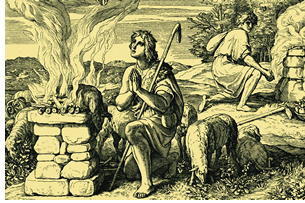Cause and Effect
Having a plan to read the entire Bible is a remarkable goal. Many begin well, yet do not finish the same. One of those reasons is the genealogies, which for most people are the most boring aspect of the Bible. The genealogies appear to be endless lists of unpronounceable names of ancient people.
Genealogies should not be dismissed so readily. The same people who consider a genealogy to be boring, will exhaust hours reviewing tiny numbers on a long list from the New York Stock Exchange. When I was in middle school,
I spent countless hours reading (and memorizing) the back of my football cards for the statistics of my favorite and notable players. The truth is that lists are only boring if they are of no interest or relevance.
For those who may regard genealogies as boring and not offering much practical insight, it is important to be reminded that “All Scripture is inspired by God and profitable for teaching, for reproof, for correction, for training in righteousness” (2 Tim 3:16). There are often noteworthy incidents in the middle of a list of names. For example, Methuselah lived “nine hundred and sixty-nine years” (Gen 5:27)!
What is remarkable concerning the first biblical genealogies is the longevity of life. Yet even they could not postpone the inevitable: death. The repetition of the words “and he died,” alert the thoughtless person to a sense of his or her mortality, and can even lead to repentance and faith in God as Savior. Genesis 4:1—6:8 portray the inescapability of one’s mortality. Nevertheless, these chapters also reveal the possibility to be recipients of God’s grace while alive.
Origin (Root) and Outcome (Fruit)
Genesis 3 describes how sin originated with the human race and ruined the ideal conditions of chapters 1—2. Genesis 4 reveals that Adam and Eve began to obey God’s command to “be fruitful and multiply, and fill the earth, and subdue it” (1:28). Eve became pregnant “and gave birth to Cain” (4:1). “Again, she gave birth to his brother Abel” (v. 2). The remainder of Genesis 4 reveals the implications of a sinful humanity and the evils that are produced. Verses 1-15 show the effects of sin upon the individual. The impact upon society is evident from verse 16 and following.
Cain and Abel both had unique interests, as evident in their offerings to the Lord (4:3-5). There is no indication why God “had no regard” for Cain’s offering, though it is reasonable to assume that the brothers were either directly instructed by God, or indirectly by their father Adam, as to what kind of offering the Lord desired. Abel’s offering closely parallels what was prescribed in Leviticus 3:16, and so would indicate that his offering was not based upon conjecture. God required that sacrifice would demand one life in exchange for another, because that would be the only means by which sin could be forgiven (cf. John 10:11; Rom 5:8; Eph 5:2).
Of course, no one enjoys rejection, especially when that involves not having favor with God. There are two options in such circumstances: either correct the situation, or become angry. Cain sadly chose the latter. He “became very angry” (Gen 4:5) with God, and then allowed his envy to become hatred toward the one (Abel) whom God favored (v. 8).
God does not abandon those who sin (Gen 4:6-7; cf. 3:21); rather, He gave Cain the opportunity to confess his guilt (4:9); sadly, he refused (v. 10). Without God as his Master, he became a slave to sin. God warned Cain of sin’s destructive power. If he would have resisted sin, he could have found blessing; however, the decision to let his sin rule over him meant it would also devour him. God is just, which meant punishing Cain (vv. 11-12, 16). Yet even the penalty was gracious (v. 15), as God could have easily punished Cain with death. Cain responded to the Lord’s gracious discipline with self-pity (vv. 13-14). He did not feel any sorrow for his sin, but only regretted the punishment.
 Sin has so affected humanity that the depraved, fallen nature will be answerable to none. Cain’s envy led to murder. He demonstrated what sin produces individually. Beginning with 4:16, the depiction is the collective impact of sin upon society. The Cainite civilization was cultured, intelligent, industrious, and progressive, yet also proud and self-sufficient (vv. 17-24). It was a society that neglected the spiritual and remained estranged from God. As opposed to a life directed by God, the Cainite civilization (from its very beginning) gloried in humanity’s achievements (“he built a city, and called the name of the city Enoch, after the name of his son”: v. 17).
Sin has so affected humanity that the depraved, fallen nature will be answerable to none. Cain’s envy led to murder. He demonstrated what sin produces individually. Beginning with 4:16, the depiction is the collective impact of sin upon society. The Cainite civilization was cultured, intelligent, industrious, and progressive, yet also proud and self-sufficient (vv. 17-24). It was a society that neglected the spiritual and remained estranged from God. As opposed to a life directed by God, the Cainite civilization (from its very beginning) gloried in humanity’s achievements (“he built a city, and called the name of the city Enoch, after the name of his son”: v. 17).
At this time, humanity consisted of two lines: that of an ungodly lineage descending from Cain (vv. 17-24), and a godly lineage originating with Seth (vv. 25-26). Genesis 5 presents the history of the godly lineage; it begins with God, who created mankind (v. 1). “He created them male and female, and He blessed them and named them Man [literally, Adam] in the day when they were created” (5:2).
Human beings are unique in all creation, because the human race alone is created in the likeness of God (cf. 1:26-27). There is nothing inferior regarding either man or woman, because God “created them male and female” and blessed them as distinct genders.
What should be immediately noticed is the longevity of those in the genealogy. Many lived to be more than 800 years in age! The simplest explanation for such long lives is that atmospheric conditions prior to the Flood restrained environmental radiations, which would have enabled people to live longer. Subsequent to the Flood, the average life span is significantly less than prior to that event.
The genealogy of Seth is encouraging, because it reveals the godly descendants of Adam. Cain’s line rejected God’s Word and promoted polygamy and violence, yet there was another lineage through Seth, who called “upon the name of the Lord” (Gen 4:26). There are always some who will serve God. No matter how many bow the knee to Baal (cf. 1 Kgs 19:18), there will always be a faithful remnant who seek the Lord. In the midst of ungodliness and wickedness, there were those who were godly and righteous. The genealogy of Genesis 5 is a crucial background for understanding the mixed marriages of Genesis 6.
Subsequent to the record of population growth—which was consistent with God’s will and purpose (Gen 1:28)—conflict intensified between the godly and the ungodly. The progeny of these unions were the “Nephilim,” which literally means “fallen ones” (6:4). In response, God chose one man, Noah, to build an ark (vv. 7-8). The marriages that resulted from the two lines would climax in judgment upon nearly all humanity. The direct factor leading to the Flood (6:9—7:24) was the ungodly union between the “sons of God” and the “daughters of men,” resulting in great wickedness (6:1-6). God’s decision not to “strive with man forever,” but to lessen humanity’s days to 120 years (v. 3), is the Lord’s gracious provision that proves His immense patience (cf. 2 Pet 3:9).
By the time of the 24th century BC, humanity had degenerated entirely. The world had become a horrible place to live, because “the wickedness of man was great on the earth, and . . . every intent of the thoughts of his heart was only evil continually” (Gen 6:5; cf. vv. 11-13). A more emphatic statement of human depravity is scarcely imaginable. The increased wickedness grieved the Lord, thus leading Him to choose one man (and his family) to save. Sin had so overtaken humanity that only Noah was said to be righteous (v. 9), which means he had fellowship with God and lived a life of obedience to the Lord. Noah did not merit the grace he received; rather, he “found favor in the eyes of the Lord” (v. 8). No person ever merits divine grace; the unmerited favor of God is always obtained exclusively through the imputed righteousness of Christ Jesus.
God declared that He would destroy the earth with a “flood of water upon the earth” (v. 17). Why would God use a flood as judgment? The answer may be that the sea was always regarded as a dangerous and stormy place to the land-loving Hebrews; it also symbolized the restlessness of the wicked (Isa 57:20), and the rebelliously raging nations of the world (Dan 7:2; Matt 13:47; Rev 13:1). Nevertheless, the God of the Holy Bible is sovereign over all creation (see Ps 29, which refers to God’s power “over many waters”), and He often uses nature in judgment of humanity.
Another reason why God may have used the Flood as judgment, is that it would effectively purge the world in a most graphic manner. The earth would be cleansed, so that not a trace of wickedness could be found. With this purification of the earth, only God’s remnant—Noah and his family (Gen 6:10)—would remain. Later in time, the Law referred to washing with water as symbolic of the purging that was necessary prior to worship (e.g. Lev 8:6, 21). The New Testament likewise used similar language (e.g. Tit 3:5). God also used the Flood to begin a new creation.
Just as there was a transformation that destroyed the world of Noah’s day and resulted in the present world, the Bible prophesies a sudden future (eschatological) judgment (not a worldwide flood but a worldwide judgment of fire) upon this present world, which will result in “new heavens and a new earth” (2 Pet 3:13; Rev 21:1). The appeal of 2 Peter 3 is to have a purifying effect upon those who believe this message, as evident in those who are “diligent to be found by Him in peace, spotless and blameless, and regard the patience of our Lord as salvation” (vv. 14-15).
Noah was in the lineage of Seth and Enoch (the godly line). He apparently had 120 years from the birth of his sons until the Lord sent the Flood (Gen 5:32; 7:6), assuming he was 480 years old when God first communicated His impending judgment. Even today, the entire human race can be divided into the godly and the ungodly, with the difference being whether a person identifies with God or not. With faith in the Lord God, you are never alone and just as safe as Noah was.
Midnight Call - 01/2022


